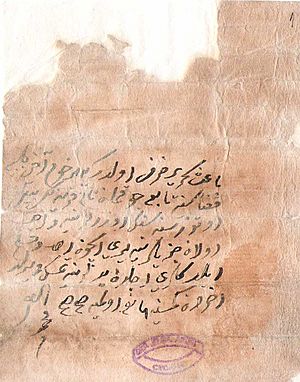Jizya facts for kids

Jizyah (pronounced JIZ-yah) is an Arabic word. It means a special kind of tax, sometimes called a "head tax." This tax was paid by non-Muslim men who lived in lands ruled by Muslims. In return, they received protection from the Muslim government. They also did not have to pay another tax called Zakat, which Muslims paid.
Contents
What Was the Jizyah Tax?
The word jizyah originally meant "compensation." Over time, it became the name for a special tax. This tax was collected from people who did not follow Islam.
Who Paid Jizyah?
The jizyah was usually paid by free adult men who were not Muslim. This included people from communities known as the "People of the Book." These were often Christians and Jews. Sometimes, rulers also collected jizyah from Hindus, Sikhs, and Zoroastrians.
Who Did Not Pay Jizyah?
Many people were excused from paying jizyah. These included:
- Women
- Children
- Poor people
- People with disabilities
- Monks and hermits
The amount of the tax was not always the same. It could change depending on the time and place. Often, the leaders of the non-Muslim communities helped collect the tax.
Why Was Jizyah Paid?
In exchange for paying jizyah, non-Muslims received certain benefits. They were protected by the Muslim government. They also did not have to serve in the military. If a non-Muslim chose to join the army, they were usually excused from paying the jizyah. This tax was a way to show their agreement to live under Muslim rule and receive its protection.
Images for kids
-
Indian Emperor Aurangzeb, who re-introduced jizya
See also
 In Spanish: Yizia para niños
In Spanish: Yizia para niños
 | James Van Der Zee |
 | Alma Thomas |
 | Ellis Wilson |
 | Margaret Taylor-Burroughs |


